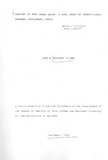| dc.description.abstract | Over one third of urban households in Kenya live in
informal settlements, lacking basic infrastructure and urban
services. There is a general consensus that the environmental
and health implications of these settlements are devastating.
In view of this, concerted efforts are directed to informal
settlements to salvage the lives of the residents, majority of
whom are poor.
This study investigates housing problems In informal
settlements. In this respect, Gichagi in formal settlements was
selected for a detailed surved. Both primary and secondary
data was collected and analyzed. A household questionnaire
was administration to a sample of 54 households. Discussions,
interviews and observation of salient features In the
settlement formed the main methods of data collection.
The study observes the housing situation in Gichagi to be
grossly precarious and concludes that there is a wide scope
for improvement. Many factors have combined to frustrate
decent housing in the settlement. The most significant of
these include lack and/or inadequate household Incomes. low
educational levels of residents and lack of
municipal/government/NGOs support in terms of infrastructural
facilities/services provision and or upgrading. The absence of
community mobilization and sensitization also
towards decent housing from these agencies influenced the
housing situation in Gichagi.
The study puts forward a number of recommendations to
improve the housing situation in the settlement. The first is
to raise household incomes through the promotion of income
generating activities. To this end the study proposes the
organization of residents in groups for purposes of undertaking
business ventures and negotiating for :financial
assistance. NGOs,local authority and the central government
should take a leading role in effecting this.
Furthermore, there is need to mobilize and sensitize the
community towards house improvement. The deployment of
community development workers in the settlement will enhance
this goal. The local authority could also provide incentives
to private organizations/individuals to invest in infrastructural
facilities in the settlement. In addition, settlement upgrading
initiated in 1991 should be pursued to its logical conclusion.
In this respect, the local authority should revise its
policies to attract private investors.
Other recommendations zero on building capacities of
residents to undertake income generating activities, to
improve their income status. This by no doubt, has great
implications on the possible nature and extent of housing
improvement in the settlement. | en_US |

